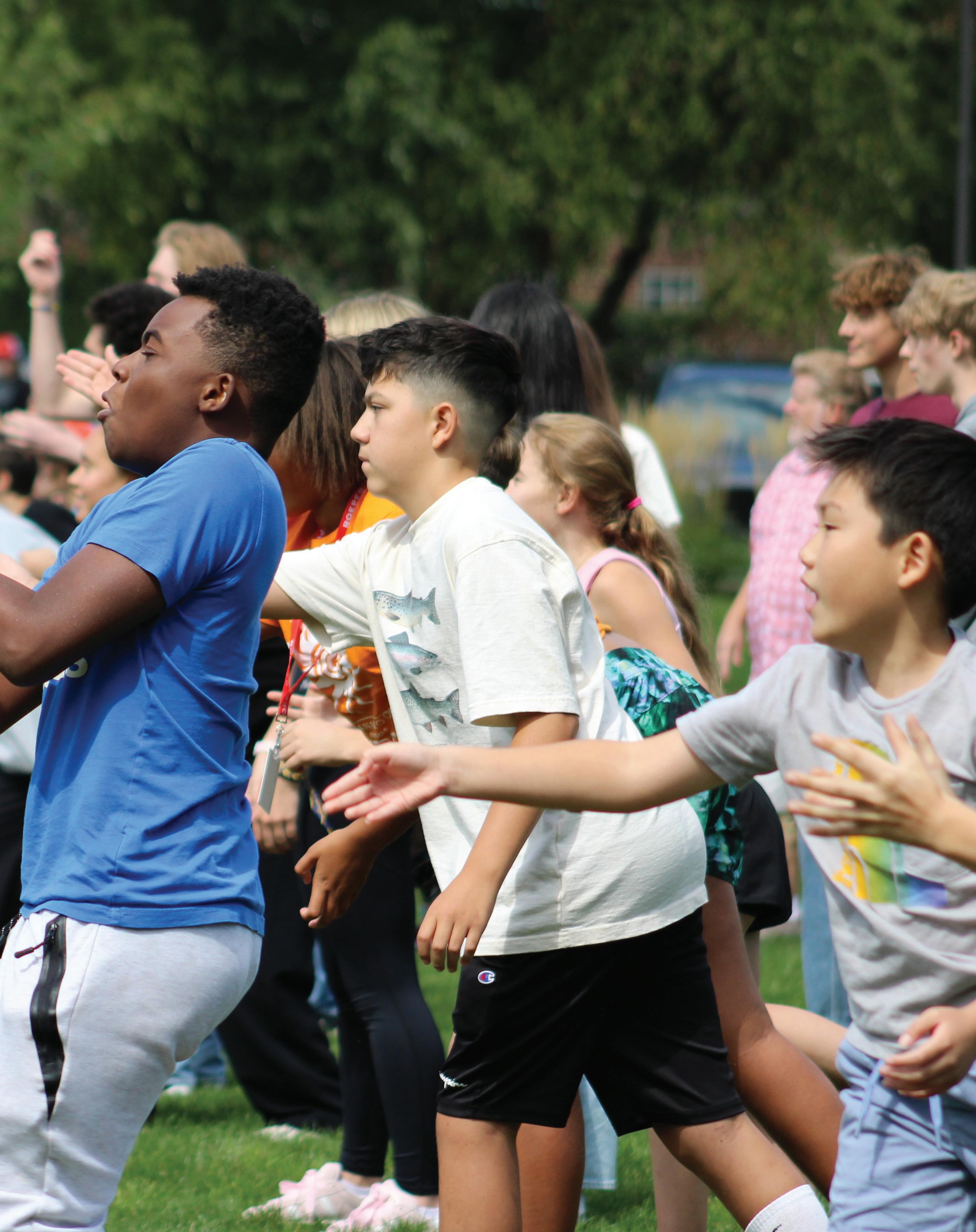
Students compete in the annual balloon toss on First Friday.
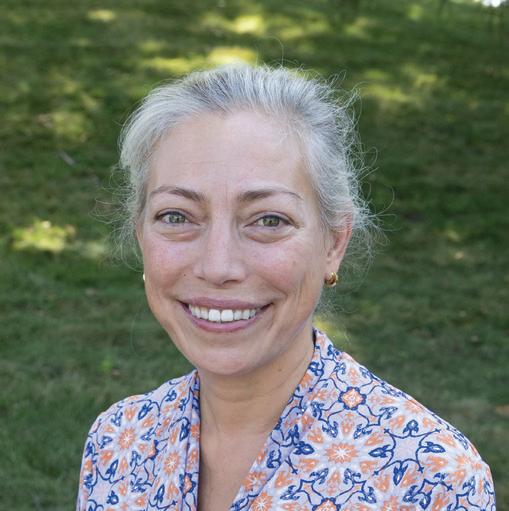


Students compete in the annual balloon toss on First Friday.

Since I arrived at Roeper this past summer, it has been my privilege to see our students and teachers bring George and Annemarie Roeper’s Philosophy of Education to life every day. Their vision and our practices are designed to remove limits to students’ learning and to support their chosen areas of inquiry and community engagement.
While there are gifted students at every public and independent school, what we do at Roeper stands out as a singular, empowering approach to gifted education. The Roeper approach is based on our respect for each student as a human being and our acknowledgement that each student has their own unique inner life and personhood. We know that every student at Roeper has their own curiosities, passions, and commitments to fairness and justice. Our program is effective because—as a matter of pedagogy—we provide each student with the latitude and freedom to express themselves, to make choices about electives, and to pursue their passions. As educators, our focus is on the students themselves and their growth. As a result, our students understand their agency and their responsibilities to the greater community.
To understand how Roeper is different, it helps to recognize two perspectives on giftedness. Transactional giftedness views ability as an exchange: students identified as gifted are expected to deliver high academic performance
in return and, later, continued educational or professional achievement.
At Roeper, we believe in and practice transformational giftedness, which is inherently oriented toward our capacity to affect the world in a positive, meaningful, and lasting way. It’s less about conforming to existing expectations and more about pushing boundaries, serving altruistic aims, and improving society. Transformational giftedness involves deploying one’s ability toward solving real, consequential problems.
George and Annemarie had this transformational student in mind when they wrote their philosophy. We understand our work at Roeper to focus on educating and supporting our students to understand themselves, their agency to direct their lives, and their potential impact on the world. The difference is not just in what one can do, but why one does it.
Transformational giftedness is driven more by intrinsic motivation (concern for others, ethical purposes, making a difference) rather than external rewards (grades, status, recognition). Therefore, we focus on cultivating transformational traits: ethical leadership, active citizenship, and capacity to address practical problems and societal challenges. The community we collectively build at Roeper each day—however flawed or contentious at times—is a microcosm of the wider world we share. Our hope is that each Roeperian will leave Roeper with the tools to know they can make the world a better, inclusive, and just space for all of us.
Students at Roeper have their own minds and their own ethical commitments. On our Lower School campus, I see that every day among our
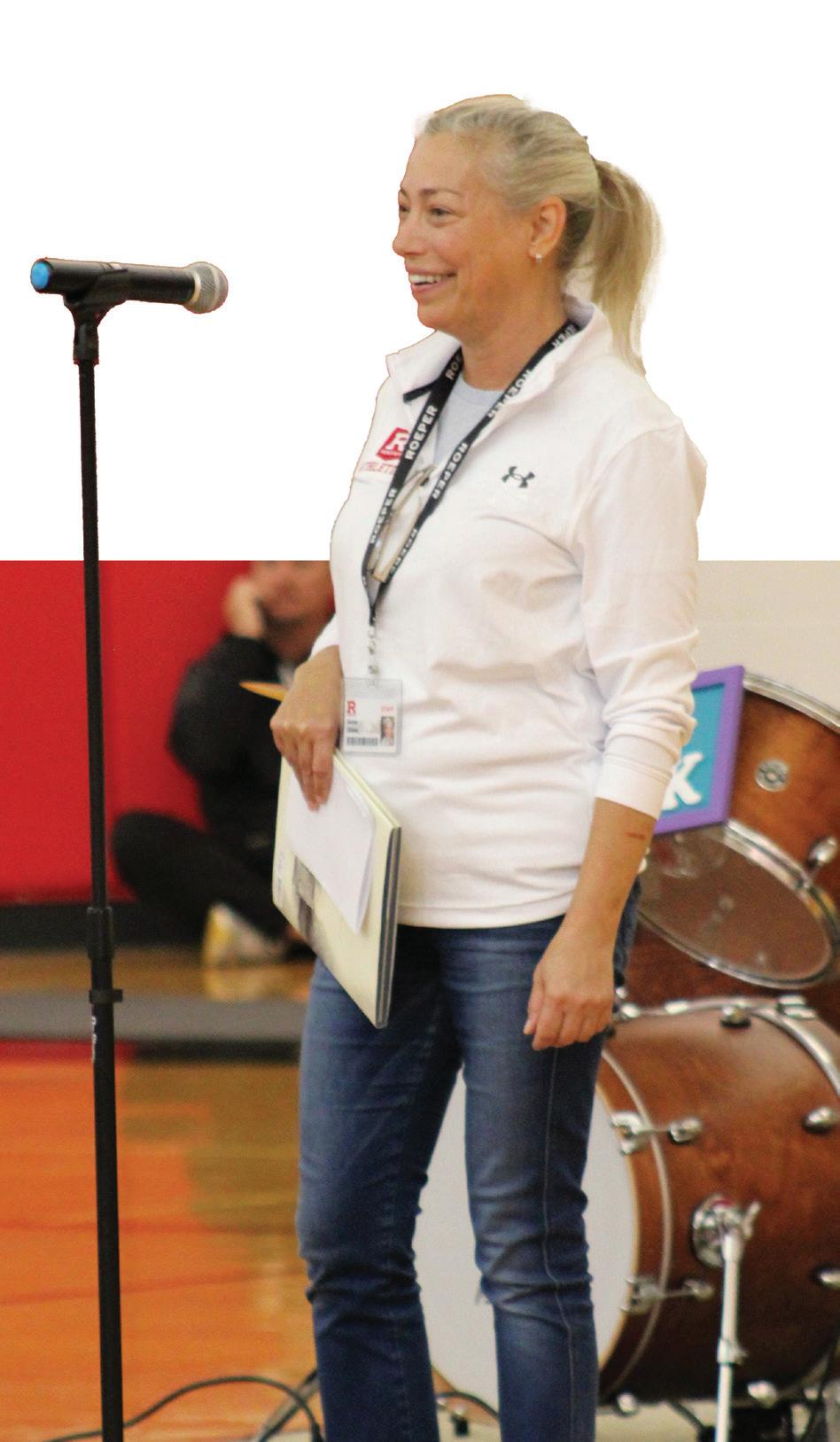
youngest students when they see me and say, “Hi, Anne!” There is no fear of hierarchical appropriateness. Honestly, what good is hierarchical appropriateness when you have something to say? I’m listening. I see it on our Middle and Upper School campus when I meet with our Student Government Officers who
consistently demonstrate their prioritization of community interests in their decision making. I see it in the Upper School office when I collaborate—or compete!—with students to solve Gretchen’s weekly puzzles. (I did win a sticker last week. Just saying.) Our students’ individual personhood is honored and celebrated every day at Roeper.
All of this comes back to Annemarie’s theory of Self Actualization & Interdependence. This is a formal way of describing our—Roeper’s— commitment to supporting each student to realize their worth, their voice, and their commitments. It also means recognizing the impact our words and actions have on others. We do depend on one another, at Roeper and in the wider world. The community we share is continuously built every single day by each person in our community.
George and Annemarie called us to do more than acquire knowledge for knowledge’s sake. They believed that, with transformational giftedness, we are also tasked with an ethical imperative.
What we—students, faculty, and families— do here at Roeper is important and consistent with our educational philosophy and our mission to embrace and support transformational giftedness.
I write this with not only my full embrace of Roeper’s mission and philosophy, but with my deep respect for Roeper teachers and students. They are doing the work to learn and think and dream and design without limits.
As always, my very best,
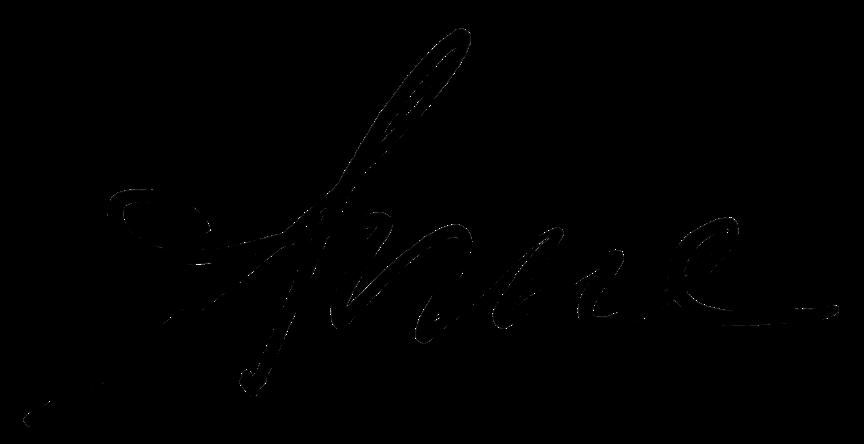
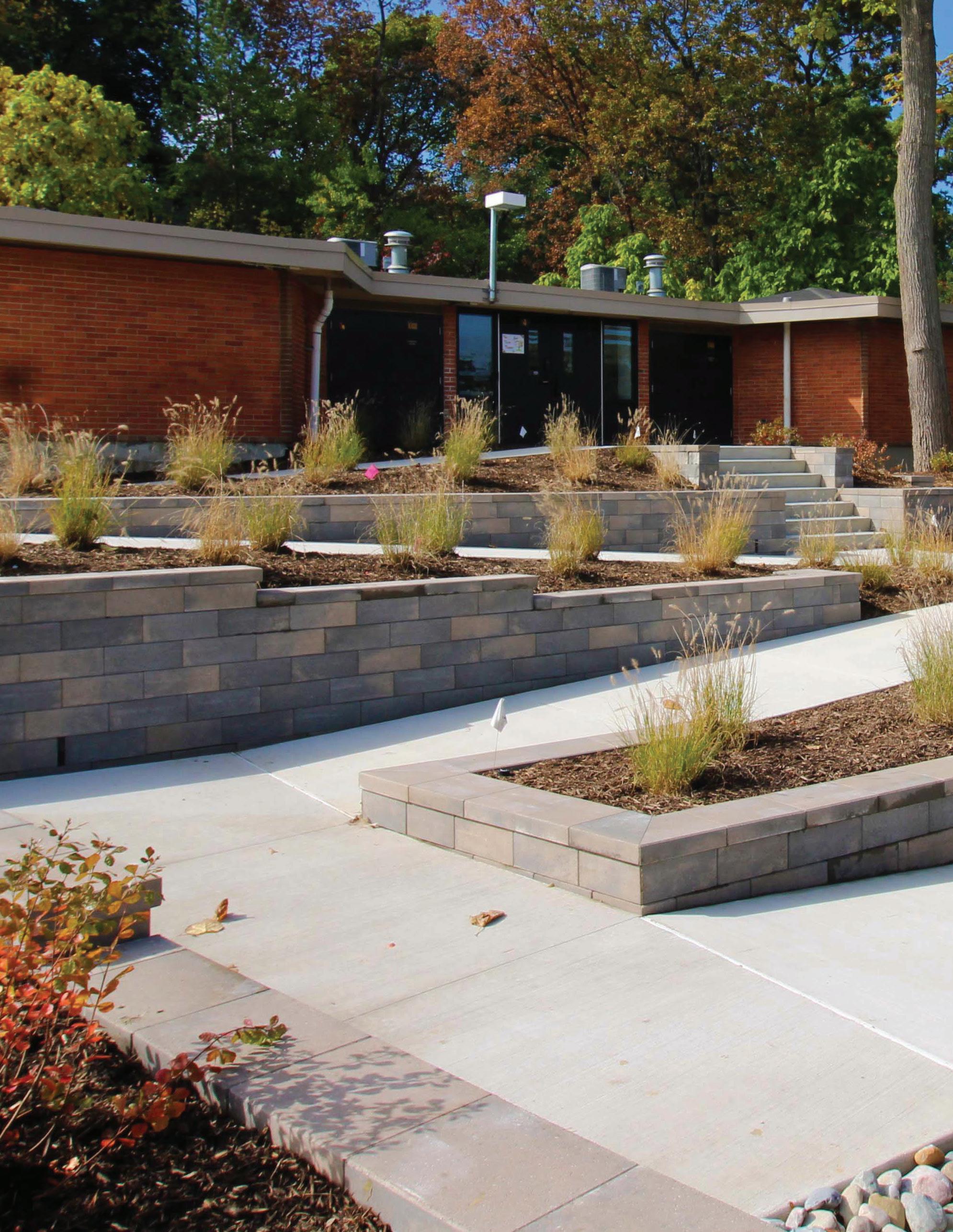
With your support of the Accessible by Design campaign, new ramps make the Middle Building on our Lower School Campus more accessible.

On one of my first days at Roeper, Mark Jeffery ’71 shared how Roeper prepared him to be a compassionate, active citizen of the world:
“Roeper helped you think about possibilities, more than barriers.”
Since then, I’ve had the privilege of meeting many Roeper graduates who live those words and who move from hope to action to create the world they want to see: a more equitable world with fewer barriers and more opportunities.
It is an honor to be here and to serve you in sustaining this remarkably special community that nurtures gifted learners so they may grow into compassionate, global citizens. I’d argue the world needs more Roeper graduates now than ever before.
All of this takes care, support, and love. And so, it is an equal honor to thank you for your time, volunteerism, generosity, and belief in our mission. Because of you:
• Students have the classroom materials and experiences they
need to thrive.
• Faculty receive professional development that fuels their work.
• Campus improvements like the new accessible ramp, walkways, and inclusive outdoor spaces at the Lower School are creating a campus without barriers that truly welcomes everyone.
This year’s Annual Fund theme, Learning Without Limits, celebrates the magic of a Roeper education that fully supports all students, teachers, and the community. Your support makes that possible, turning opportunity into action.
Thank you, Roeperians. I’m excited to meet you, hear your Roeper story, and support your lifelong connection to this special community.
With gratitude,
Director of Development
In the heart of Hindstrum, the outdoor classroom invites students to learn without limits. Where every rustling leaf, murmuring river, chirping bird, and winding trail lends itself to boundless adventure. In a space where curiosity leads and walls no longer confine, children learn at their very best.
Gifted children, in particular, are driven by insatiable curiosity, a sense of wonder and a deep desire to understand the world and how they fit into it. Nature provides the perfect environment for this kind of exploration, rich with opportunities for discovery, self-reflection, risk taking, and growth.
While playing in White Pine Woods or monitoring the creek, our students are not only learning about stewardship, ecosystems, and environments; they are learning how to solve problems, take risks,
communicate with one another, and challenge their thinking.
Our outdoor classroom spaces are transforming learning and making it more accessible to students who may struggle to learn in a more traditional classroom. When walls are removed, children feel a greater sense of freedom to express themselves, learn in different ways, and construct new knowledge with classmates they may not have while sitting at tables.
Inspired by the natural world, students are writing, drawing, creating, asking questions, moving with purpose, and solving problems with fresh eyes and open minds.
In an outdoor classroom, learning knows no bounds, where the sky becomes the ceiling, the earth the floor, and every moment invites curiosity, connection, and endless discovery.


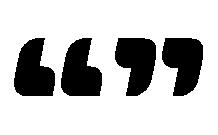

Every part of the environment contributes to the learning milieu Living with nature and beauty is a constant reminder of the rhythm of life and global interdependence and our place within it.
-ANNEMARIE ROEPER

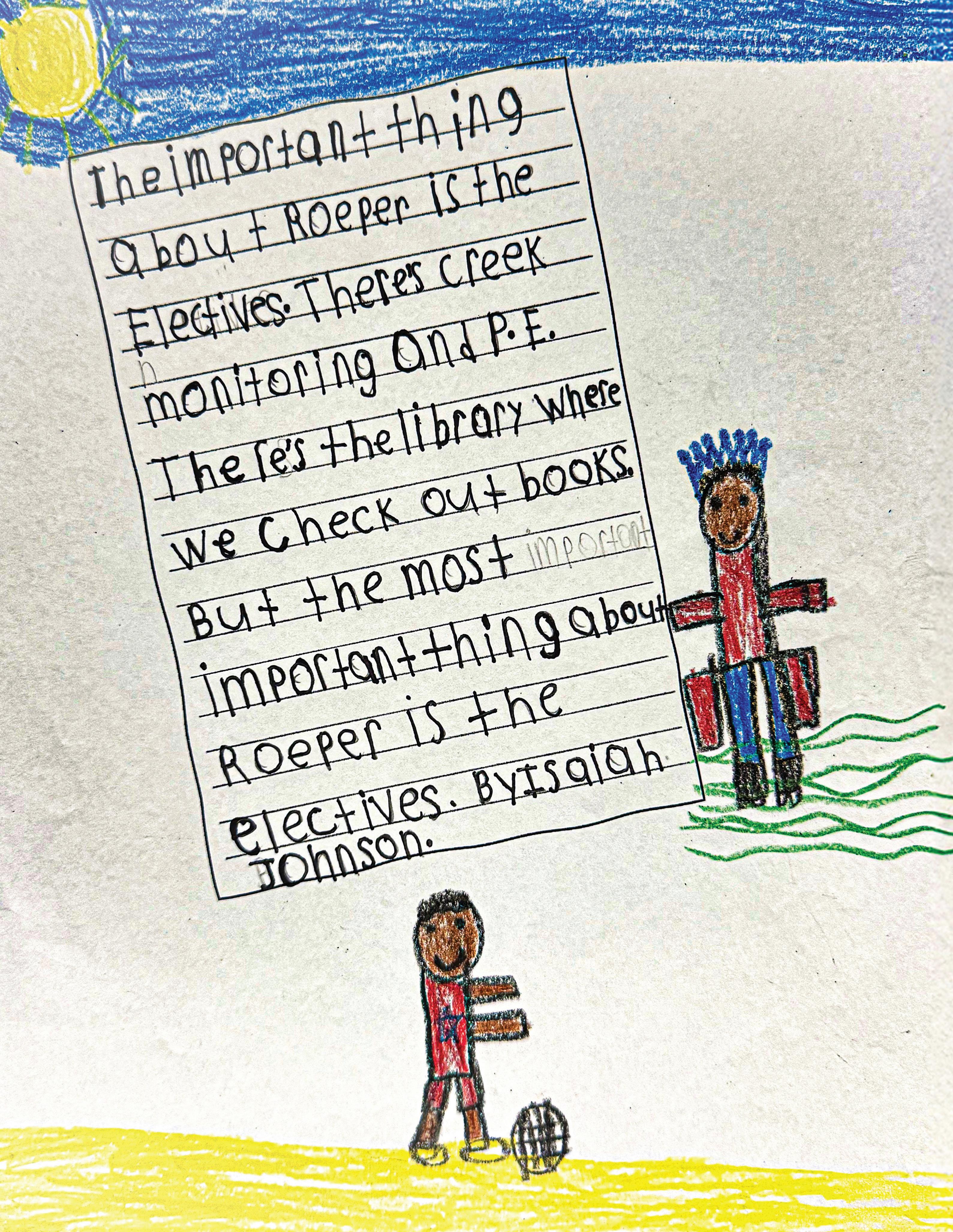
Stage IV project: The Important Thing About Roeper.
Human relationships are at the core of who we are as an institution, and the learning that takes place here is grounded in the trusting, invigorating community that teachers cocreate with students inside and outside of the classroom.
Technology enters the picture only when used ethically and in a developmentally appropriate manner as a tool to enhance learning. The exciting ways students can use technology to demonstrate their learning are intriguing, ranging from multimedia presentations to creating their own interactive, immersive environments.
In the Lower School, much of our work with devices is integrated through homeroom projects and practices with support and in consultation with our Technology Education Team. Specific computer skills are taught in specials classes
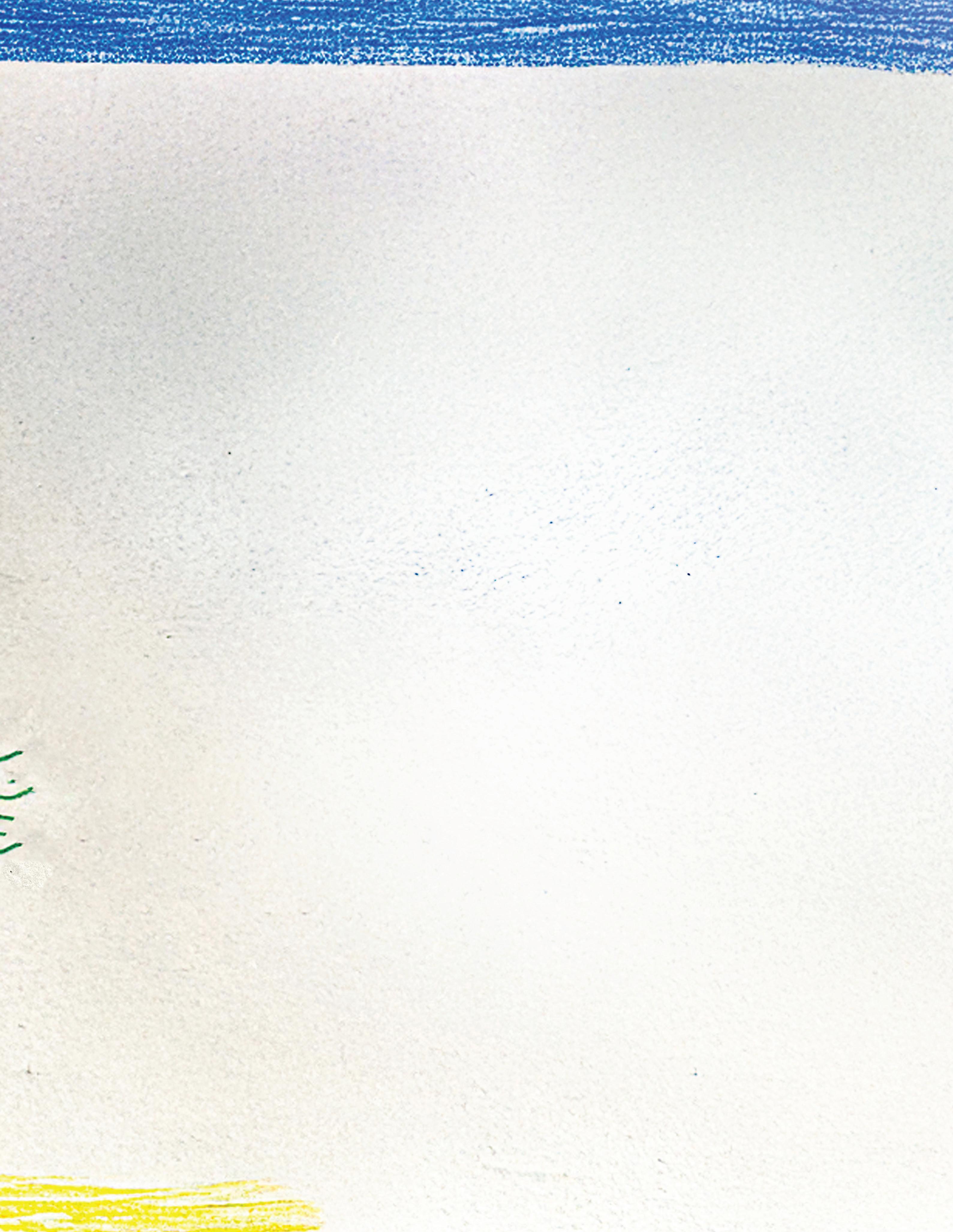
and electives, covering research, basic operations, keyboarding, presentations, word processing, acceptable use and safety, and security with all students in Stages III–V. Additionally, electives offering other technological options, including coding, robotics, Roeper Report, graphic design, and makerspace, are a part of our technology program. While our youngest students are not engaged in direct computer use, there is a plan to model classroom usage. As a Lower School, we acknowledge the necessity of being digitally literate and the importance of creatively providing access to the wealth of information available through technology. This approach satisfies the voracious curiosity of our gifted learners and serves as another way for them to express their boundless creativity.
HARRIS LOWER SCHOOL DIRECTOR



While school projects are often confined to the four classroom walls, last spring, Stage III students took their learning beyond our campus to the Detroit River International Wildlife Refuge in Trenton. There, rangers and conservationists posed a particularly puzzling challenge to our young problem-solvers:
How might we help the Detroit River International Wildlife Refuge prevent the spread of White Nose Syndrome in bats?
This real-world problem was the perfect opportunity for students to learn a new method for solution-finding that did not limit them to two solutions in which the best option was the least bad one.
Using Integrative Thinking, a protocol developed by the Desautels Centre for Integrative Thinking at the University of Toronto’s Rotman School of Management, our students learned how to derive a third solution that presents a win-win outcome that benefits all stakeholders.
From our visit to the wildlife refuge, students learned that White Nose Syndrome is a fastspreading fungal disease that has already killed millions of bats across North America—including in Michigan. Bats are a vital part of our ecosystem, and their loss affects us all. But protecting bats also means making some changes to how people interact with the natural spaces they love. That’s where our students came in.
Using integrative thinking strategies like the ProPro model and the Mash-Up, students built empathy for both the bats and the people who enjoy and share these outdoor spaces with them. They learned to consider multiple perspectives, ask better questions, and creatively combine ideas that might not typically be juxtaposed. Instead of choosing one side or the
other, they created new solutions that allow people and bats to safely share the same environments.
When students developed their final recommendations, they had an authentic audience for their learning and solutions. Detroit River International Wildlife Refuge Directors Dan Kennedy and Lisa Bryant visited the Lower School to listen to our students’ recommendations and provide feedback.
In one model, students designed signs and educational materials to inform hikers and families how to avoid spreading the fungus. In another, they proposed special bat-safe zones that give bats the quiet they need while still offering people access to nearby trails. Each idea came from deep thinking, respectful dialogue, and a real sense of purpose.
Their work is a powerful reminder of what’s possible when we treat even our youngest learners as problem-solvers and give them an opportunity to develop empathy and solve a real problem.
Addressing faculty in 1963, George Roeper said, “Maybe the most important thing we have to do with our children is to make them ready to adapt themselves to change.”
By learning to face complex problems now, our students are building the resilience and creativity they’ll need for the future, whatever it may bring.


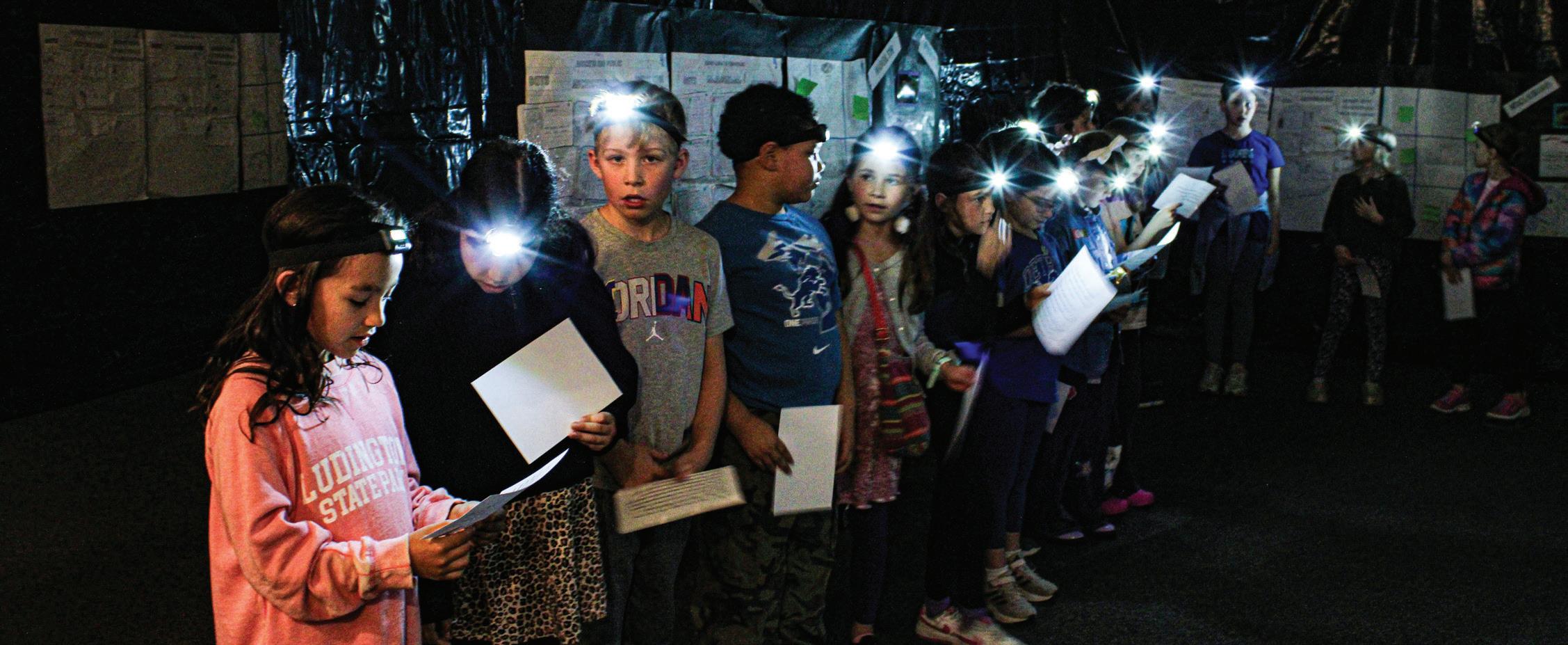
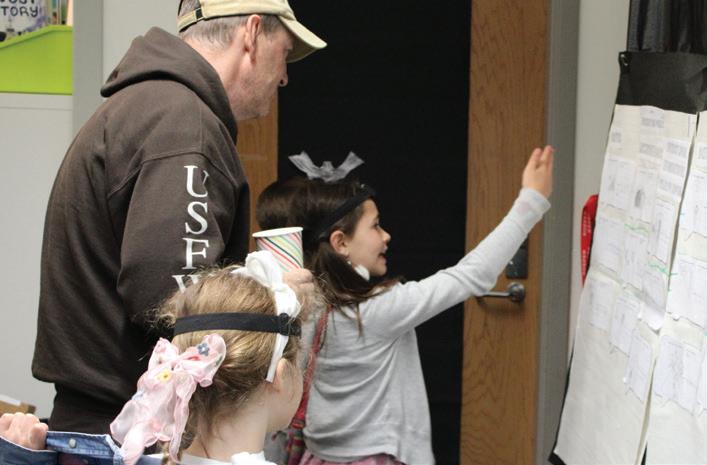
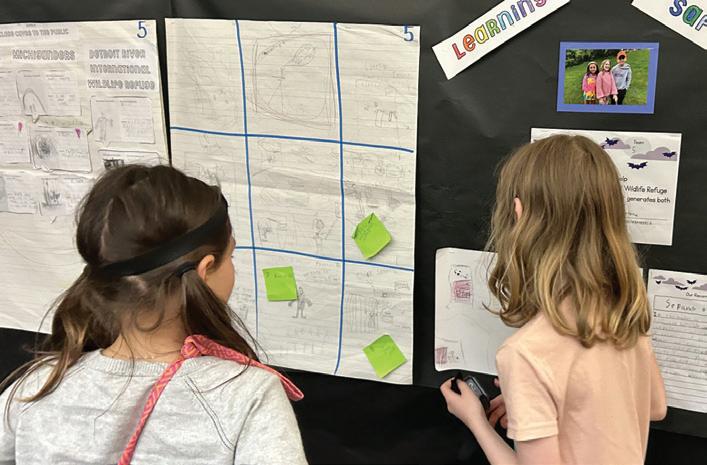
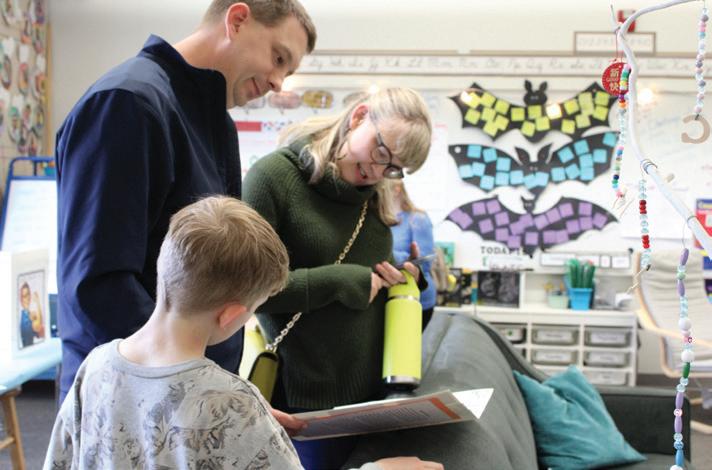
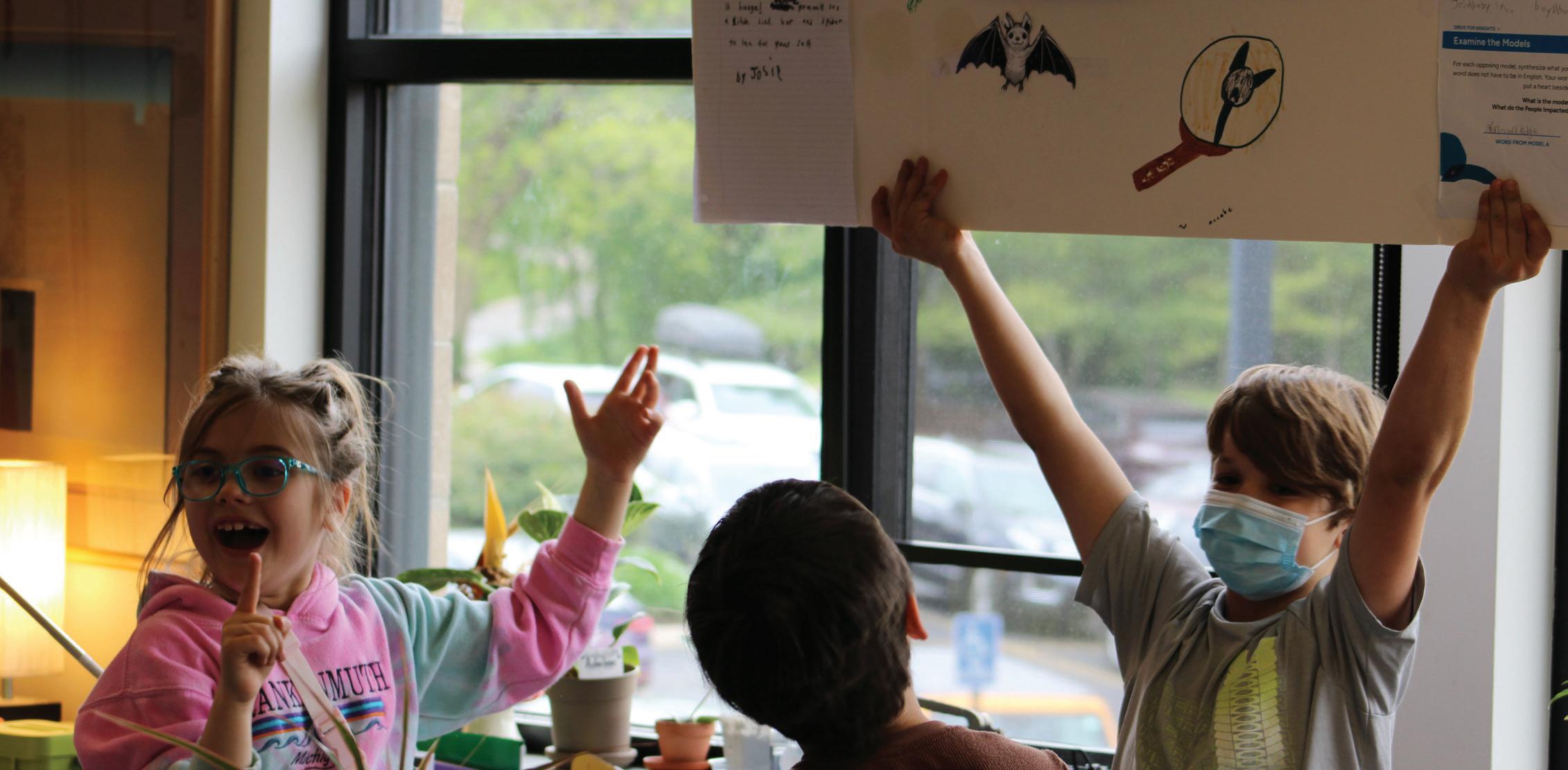
Stage III students present their findings and solutions.
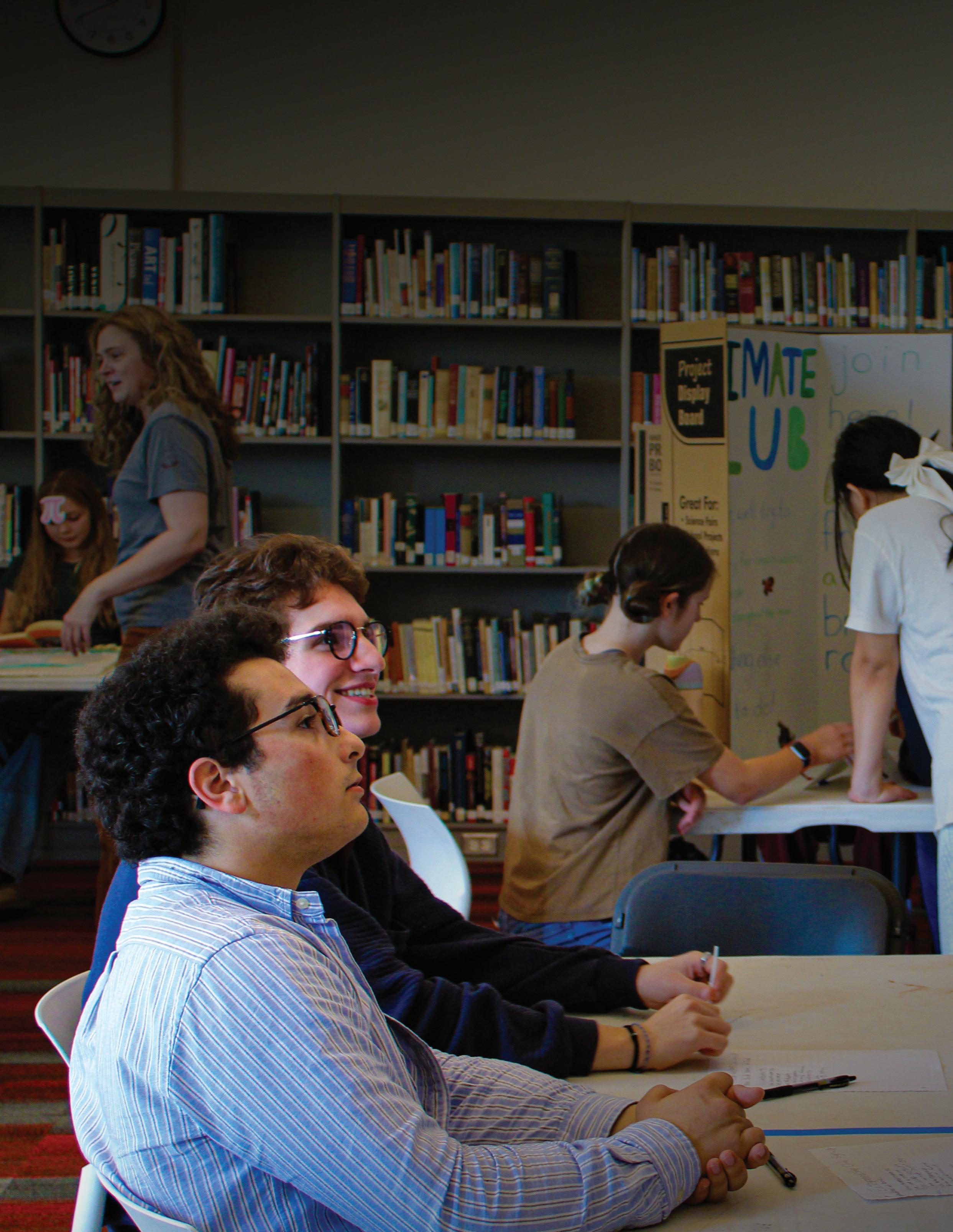
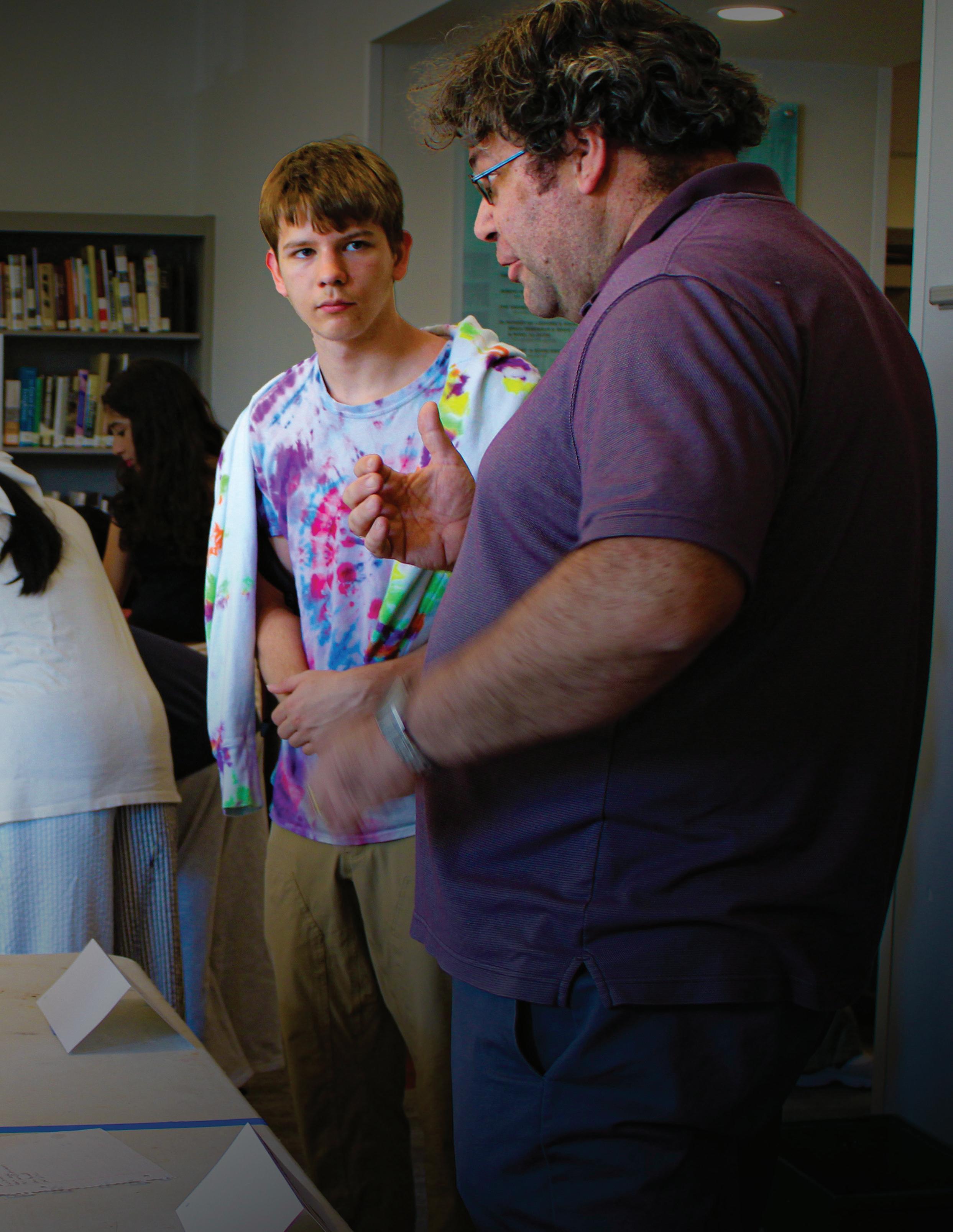
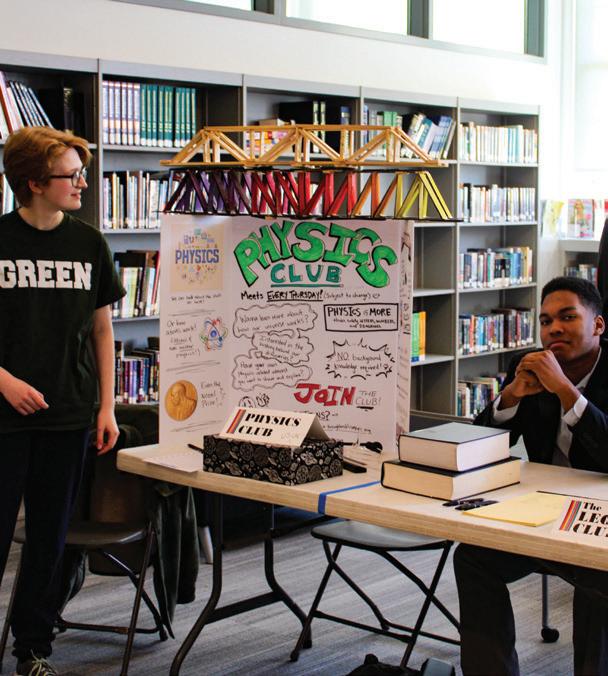
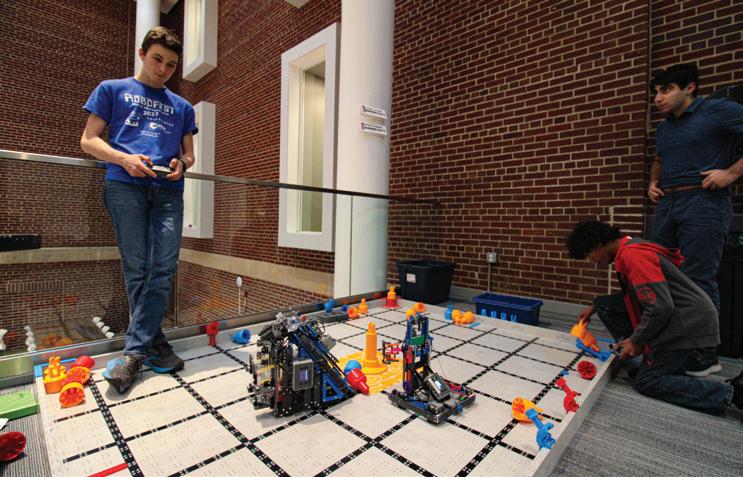

Every fall, the Club Expo highlights the many ways students connect and collaborate. 51 clubs are student-led and supported by faculty advisors.
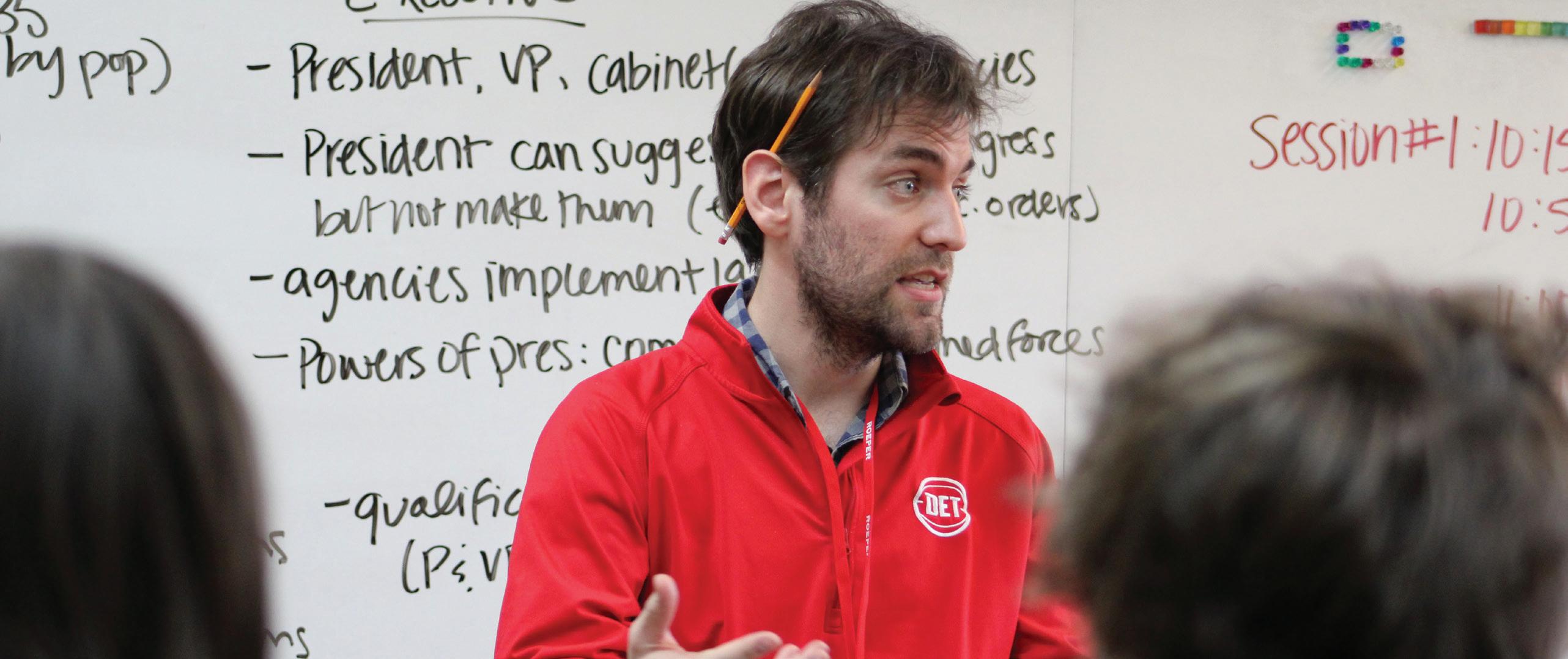
“ Our community thrives when curiosity, creativity, and connection know no bounds.
On February 27, 2026, Roeper will welcome alumni back to campus for Philumni Day (Philosophy + Alumni = Philumni), a living expression of “Learning Without Limits.”
This special day transforms the Middle &
Image shows Ben Fallert ’09 speaking to students on Philumni Day 2024
Upper School into a space where generations of Roeper thinkers, dreamers, and doers come together to blur boundaries between past and present, classroom and world, imagination and reality. Alumni from diverse fields will share how Roeper’s philosophy empowered them to see beyond conventional constraints, to turn challenges into opportunities, and to cultivate potential that
continues to blossom long after their school days. Through storytelling and workshops, students will not only glimpse the possibilities that lie ahead but also feel part of a larger continuum of Roeper learners—proof that our community thrives when curiosity, creativity, and connection know no bounds.
SHANI YAPA-KIMPSON DIRECTOR OF ALUMNI RELATIONS & ANNUAL FUND
Being one of the student trustees is a very unique position to Roeper. We are student voices on the board (highly unusual for a Board of Trustees) and are responsible for most student-board communications.
I really can’t overstate how much this experience has taught me. It showed me the extent to which our community can survive conflict together. Students, teachers, administrators— what we all have in common is that we want the best for Roeper. That binds us together. Whether it’s by example of other leaders or by practice of trying it myself, board service taught me how to better speak my mind, the importance of effective communication, and how to resolve conflict. Those lessons will stick with me far beyond school.
I love serving my community, a desire that Roeper fostered and allowed to thrive in me. I ran for the student rep to do just that: give back. I’ll always be thankful for that opportunity.
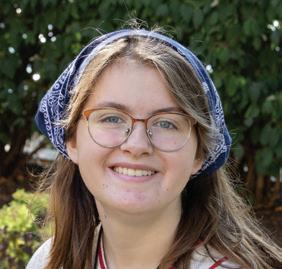

ANNA STUNTZ ’27 STUDENT TRUSTEE
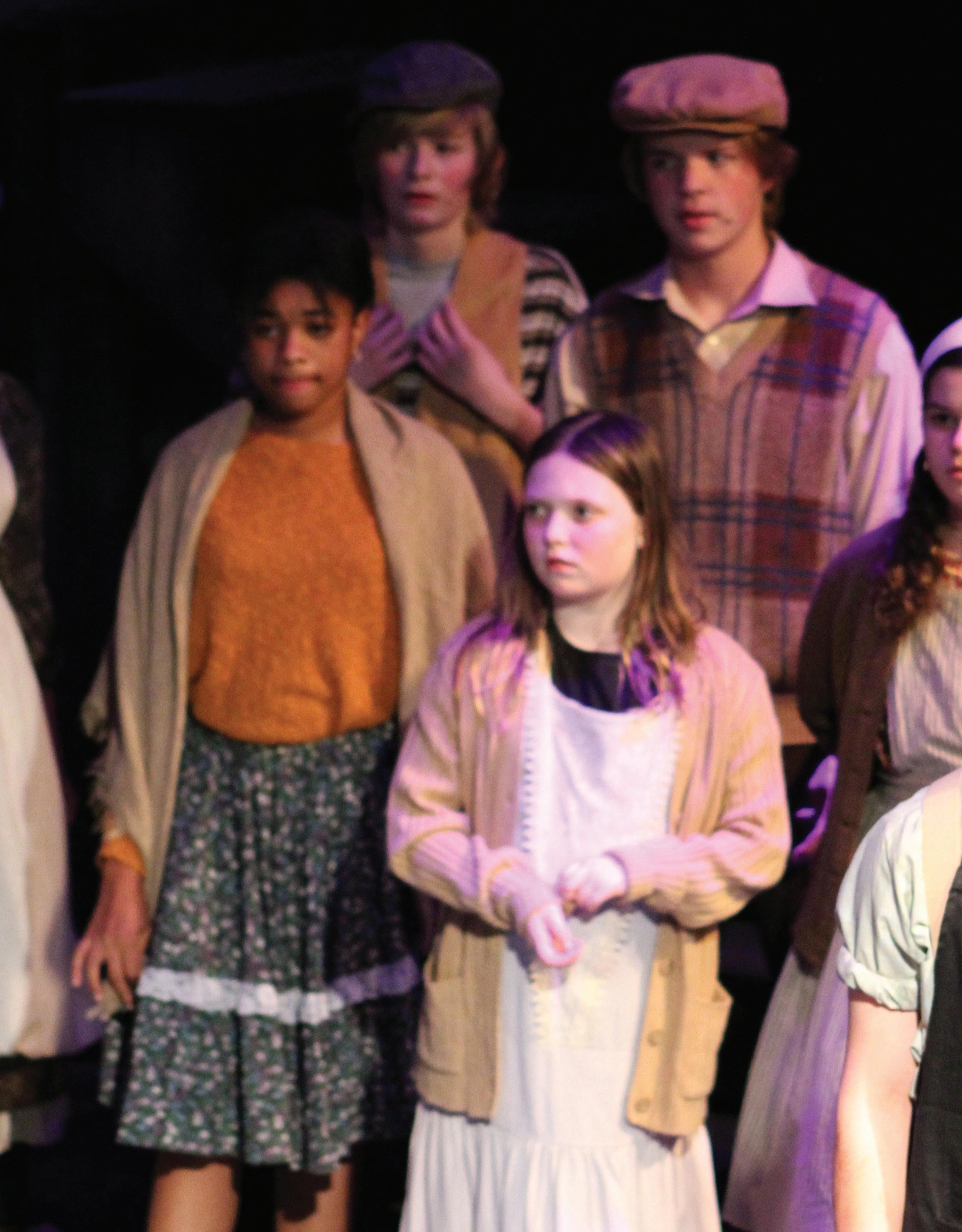
I’ve always been a fan of performing arts, and Roeper’s main stage program. With its no-cut policy, Roeper allows me to try new things without having to worry if I’m good enough, consequently, allowing me the experience needed to be better than I could be otherwise.
There’s a thing about programs that do cuts, where you have to already be good in order to get in, or else have a standing relationship with the people casting. Roeper sidesteps that, while allowing everyone chances at larger parts through smaller cast sizes. Overall, I feel like I’ve done better at Roeper than I could have anywhere else.
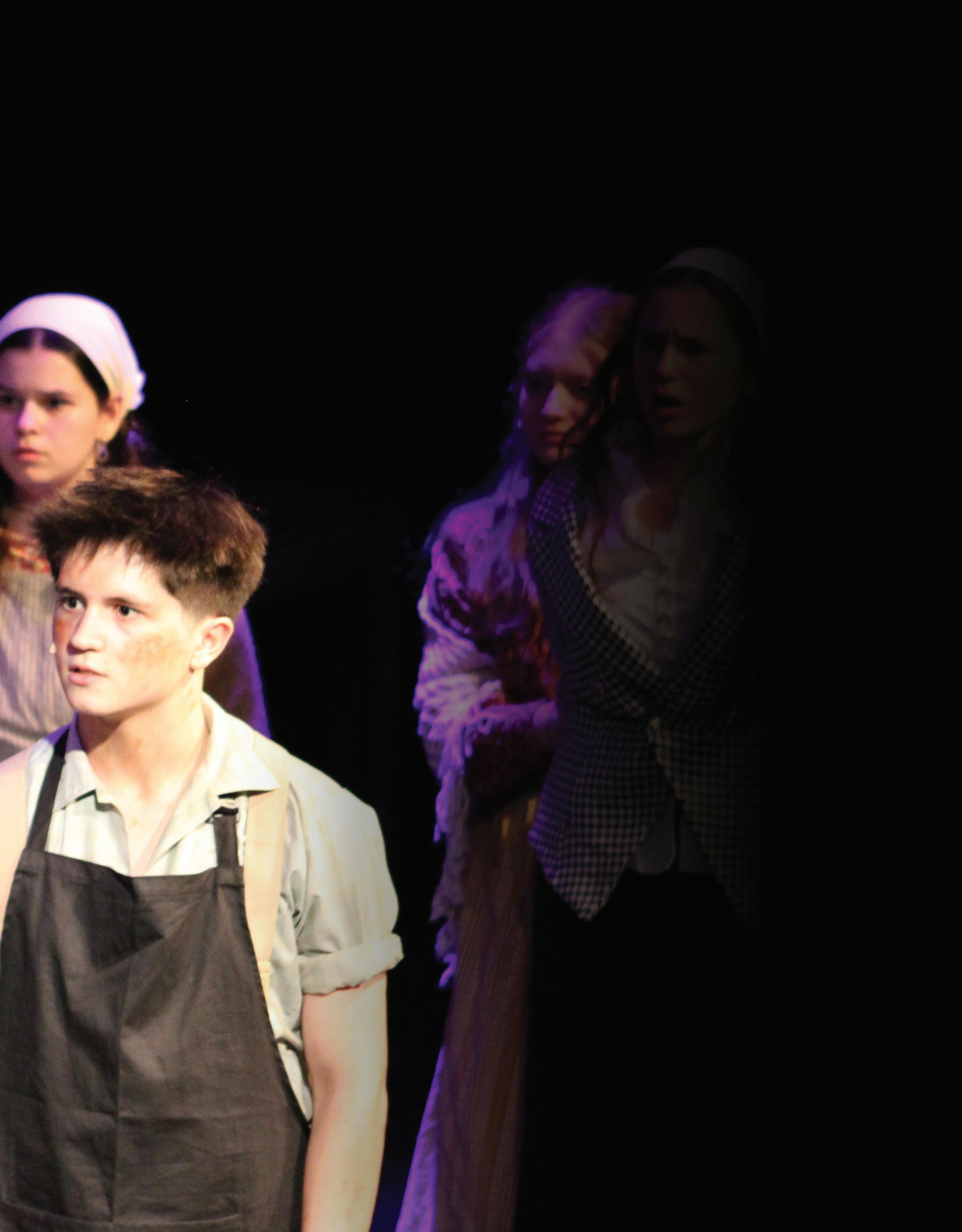
LILLY BRINN ’28
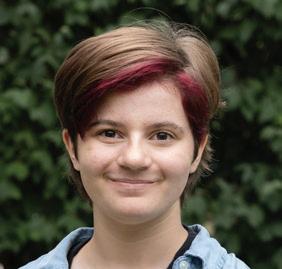
Throughout high school at Roeper, I’ve spent every winter in the CCB competing with my basketball team and every spring on the track running with my 4x800 relay team. But until my senior year, I had never joined a fall sport. Despite never having played soccer before, the soccer team welcomed me onto the field for the fall season. Under the leadership of State Champion Coach Ed Sack, I learned how to embrace and overcome the unfamiliar struggles that came with a new sport. Roeper Athletics gave me the opportunity to try something new, learn from failure, and join a new community.
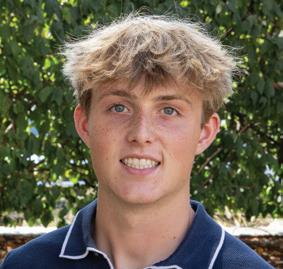
WILL CLAYPOOL ’26



SHANI YAPA-KIMPSON DIRECTOR OF ANNUAL FUND & ALUMNI RELATIONS
For generations of Roeper students, the senior project has been more than a capstone—it’s a launchpad. Long before graduation day, these projects invite students to take ownership of their learning, follow their curiosity, and test ideas in the real world. We asked several alumni to look back on their experiences and share how those early explorations of independence, creativity, and purpose continue to shape their lives today.

My senior project was “That’s What He Said”: Understanding Masculinity. It was designed based upon a troubling behavioral trend observed with those who identify as young men throughout the Roeper Community. Many young women within the community, including those I considered sisters, vocalized mistreatment at the hands of their peers. So, in
a proactive attempt to remedy the situation, I decided to teach a class providing guidance and understanding on how to carry oneself as a young man in a manner beneficial to oneself and those around you. With the support of many teachers, faculty, and fellow students, the class was a relative success. I had complex well-researched discussions with students that promoted critical thinking and even strengthened my own understanding of myself as a man as well. Having this on my resume was also extremely beneficial to me in my academic and professional career.
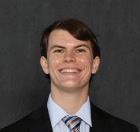
For my senior project, I worked on writing a fantasy novel that was structured as a series of reports, journal entries, letters, and songs that would tell a larger overarching story. While I didn’t reach the ending, I ended up writing around 100 pages of work. This was the first time I’d ever tried a major writing project and having that opportunity to get my concept for a story off the ground and to work with an amazing advisor (Dan Jacobs) is something I will always
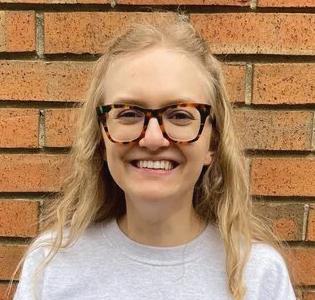
For my 2014 senior project, I combined my love for fashion and makeup with my budding interest in business to launch Sock Hop Cosmetics. I hand-mixed and formulated lipsticks, developed the brand, and filed the proper LLC paperwork. This project not only confirmed my passion for blending creativity with entrepreneurship but also helped shape my academic and career path. At the University of Michigan, I pursued my
If you’ve made it this far into Keeping In Touch, you’re already familiar with senior Jayden Hertzberg’s 2025–26 senior project. Her photography has been included in each of the last three issues of this school publication and is on full display on this issue’s cover. In fact, Jayden’s work has been interlaced into all of Roeper media for the past two school years—you likely just haven’t realized it. It wasn’t until the end of last year, however, that Jayden approached me and asked if I would be an advisor for her senior project, kicking off a collaboration that has been both a portfolio-building
be grateful for. It encouraged me to turn my ideas and passions into something more concrete and continue holding onto them. I took my love of writing with me to college, and my senior project directly led me to my major in Creative Writing and Literature. I completed a 102-page manuscript of poetry as my honors thesis as well as an 85-page collection of short stories for a class during my final year. Currently, I am a firstyear student at Wayne Law, but I still set time aside to write new poems and stories and share them with people.
BBA and was able to join the entrepreneurship institute, an opportunity made possible due to Sock Hop. After graduation, I worked as a buyer at Bloomingdale’s, where I once again combined my love of fashion with business. More recently, I earned my MBA and now work on the business side of the entertainment industry. The Roeper Senior Project gave me the amazing chance to explore my passions in a supportive environment. I am so grateful for the experience and how it helped spark my entrepreneurial spirit!
experience for her and instrumental in my day-to-day work. For those who don’t know me: I’m the school photographer and designer. Beginning this school year, Jayden and I sat down and formulated a plan on how to build a strong photography portfolio. Roeper gives Jayden the unique opportunity to be an event photographer and have her work appear in magazines, on social media, and in advertising—all before graduating high school.
BY JACK WILLIAMS DIGITAL MARKETING & DESIGN SPECIALIST
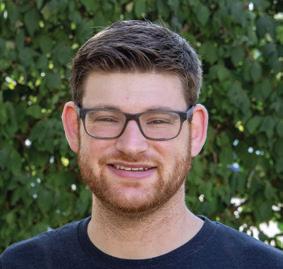
When I was eleven, I was an organizational disaster who hated group projects more than anything. At home and at school, I never quite knew where I needed to be or what I needed to do, or how to work with people to get things done. I wish I could tell sixth grade Ben that, in May of my senior year, I would (successfully and competently!) organize a team of students and teachers to produce TEDxTheRoeperSchool, a celebration of ideas featuring six expert
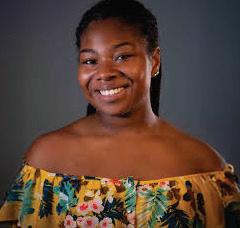
I loved my senior project so much! I partnered with Brilliant Detroit to lead an after-school book club for elementary school students. Reading was a fundamental part of my childhood, and I wanted to help it be a part of others. Not only did I want to help kids improve their literacy skills, but I also set out to introduce them to social justice topics through stories. I found this to be a mutually beneficial experience for me, the children, and Brilliant Detroit. I worked closely with Aaron Appel ’12 to ensure that my project aligned with the organization’s existing programming. He helped me develop strategies to keep the kids engaged and provided context that made it easier for me to start working with them. Carolyn Lett [former Director of Diversity] was a great sounding board when it came to writing curriculum for the program and advising me on how to approach topics like
speakers sharing their work and knowledge with an audience of 100. My senior project was many things—an opportunity to inspire dialogue and mutual pursuit of knowledge, a festival of speech and communication, a chance to learn in community—but, in my educational journey, it was a chance to recognize and mark my growth as a learner and human being. The experience gave me the confidence and ability to later take on my most fulfilling long-term projects, lead teams, and mentor others as they pursue their passions.
racism and sexism with young children. I gained so much from this experience and wanted to stay engaged in programming like this in college, so I joined a mentorship program for Chicago Public School students. This background allowed me to join the organization with confidence and eventually become one of the lead curriculum writers. My senior project taught me so much, like organizational and leadership skills, but most importantly, it showed me that I’m able to use my resources to actualize my ideas. My final project was so different from what I thought it would be at the beginning, but I’m so proud of what I did. Oftentimes, when I wonder if I can take on a challenge, I think back to this project and all that I was able to accomplish. Finding that I was capable of creative and hard work early in my life has made me much more confident in the roles I take on and challenges I face. Completing a senior project is such a unique opportunity, and I’m grateful that I took advantage of it. It’s much harder to find the time and support to complete a project like this after graduation.
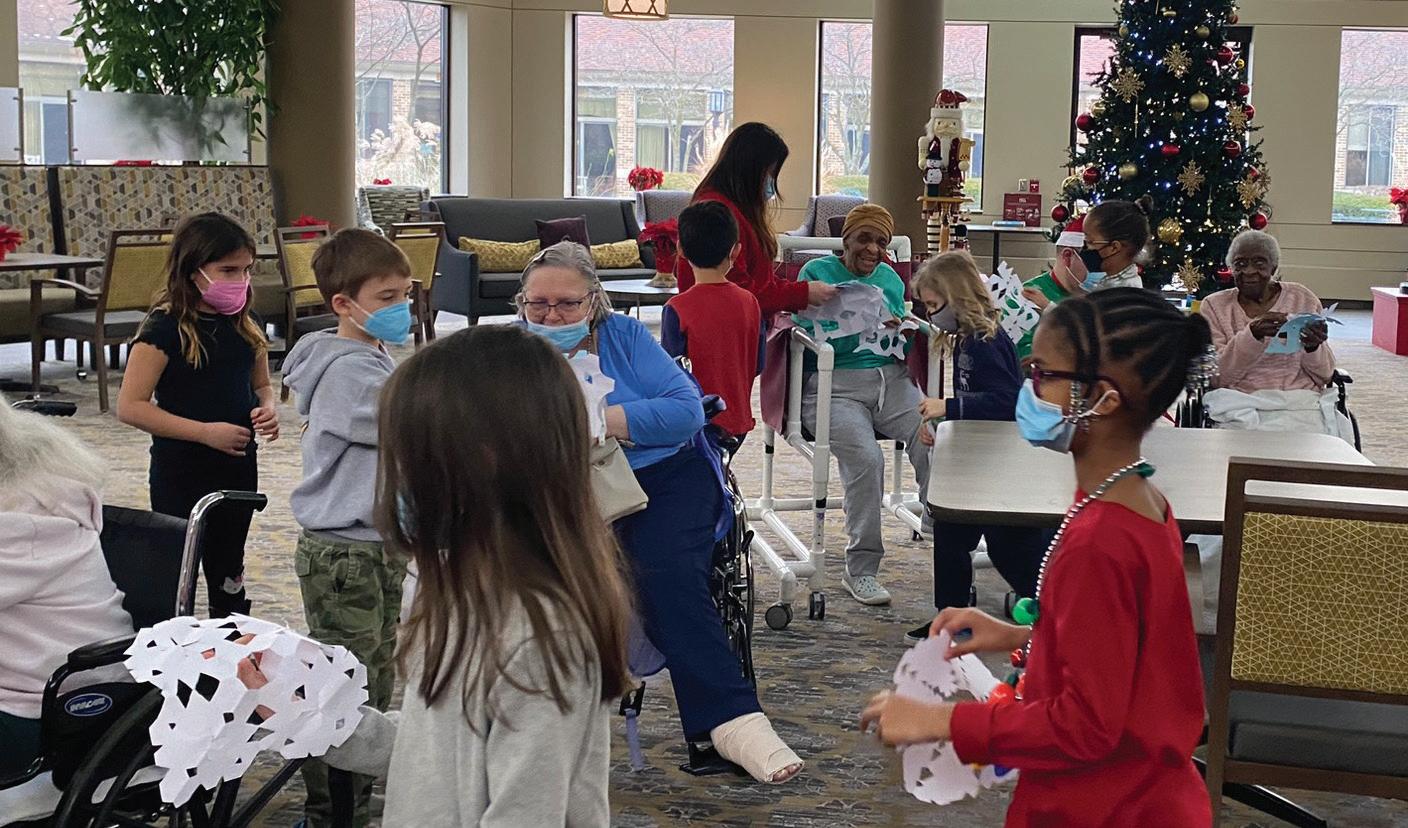

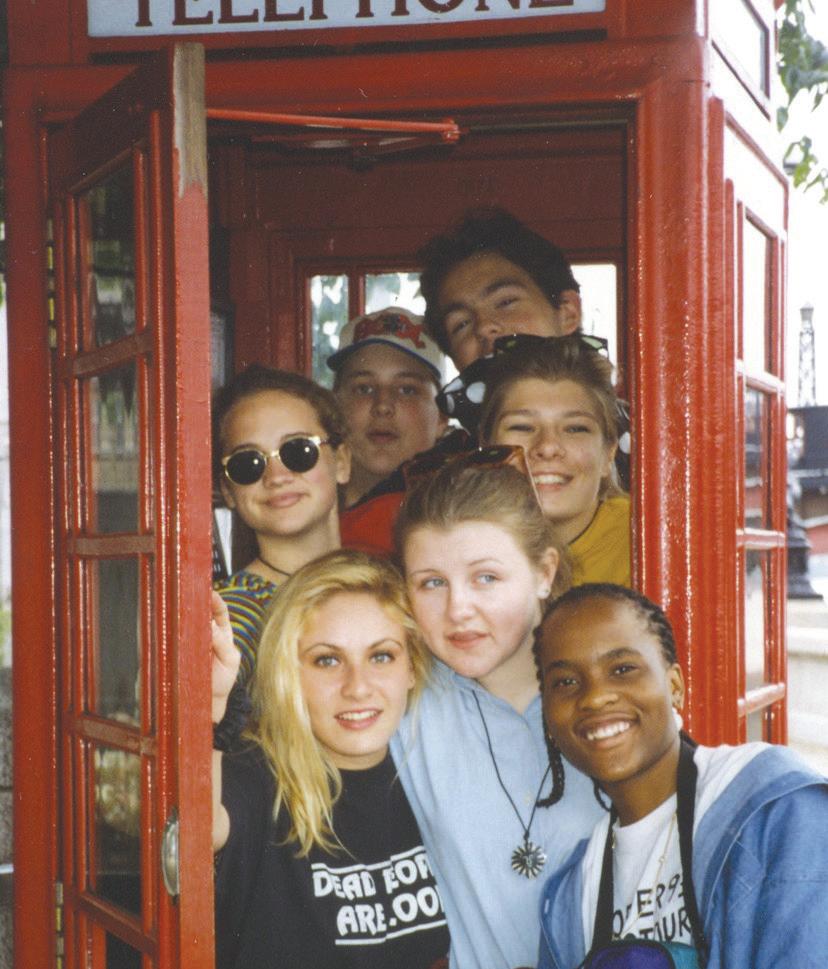

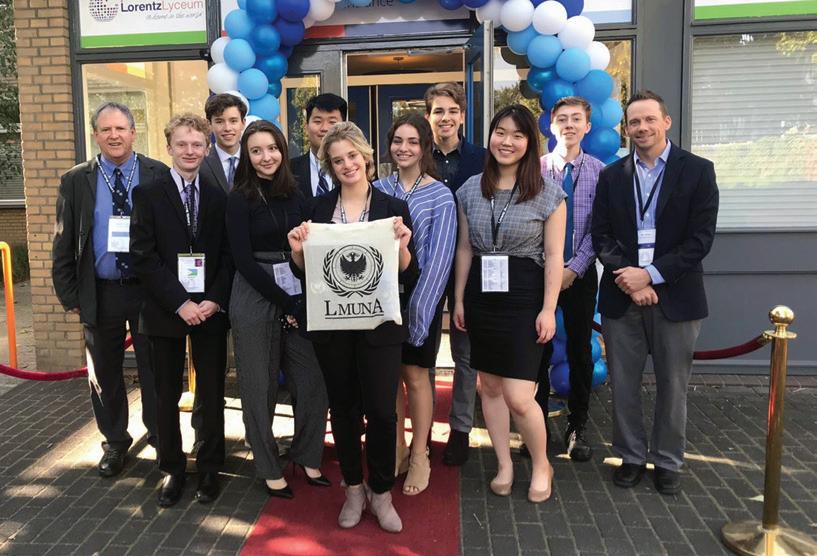

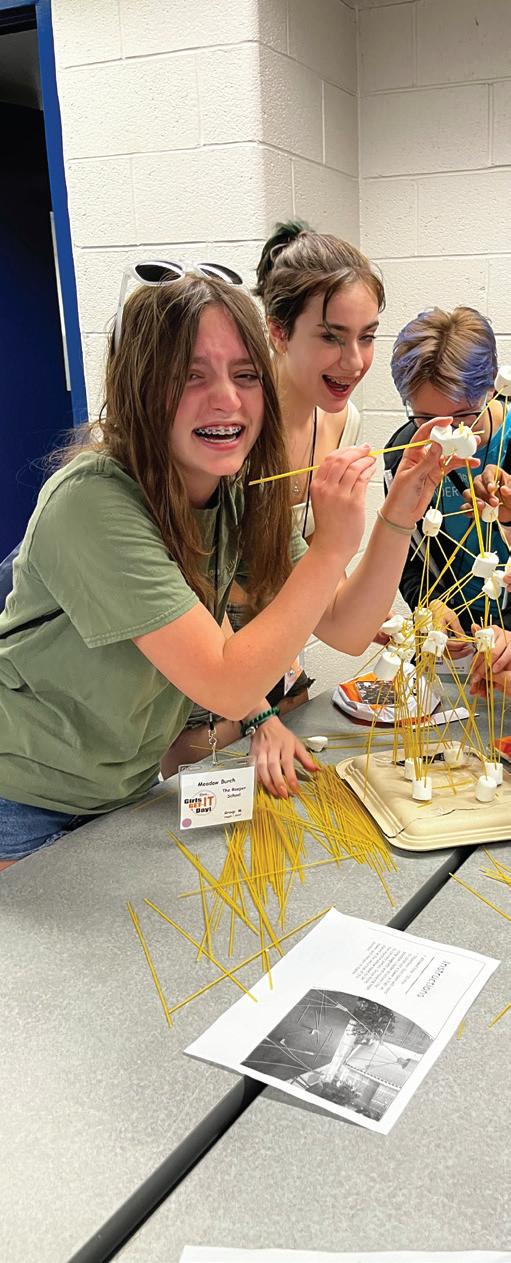



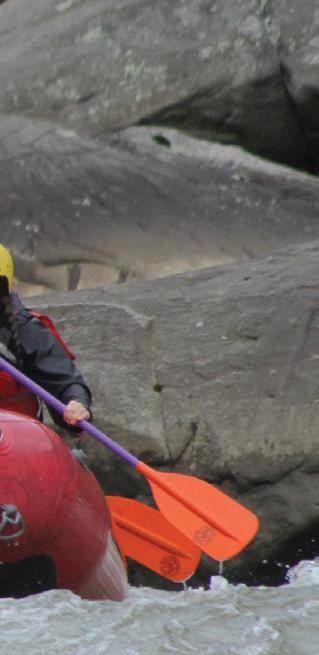
Roeper students experience the world as their classroom. Each journey deepens understanding, strengthens empathy, and reflects our mission to nurture lifelong learners who think deeply and act with purpose.
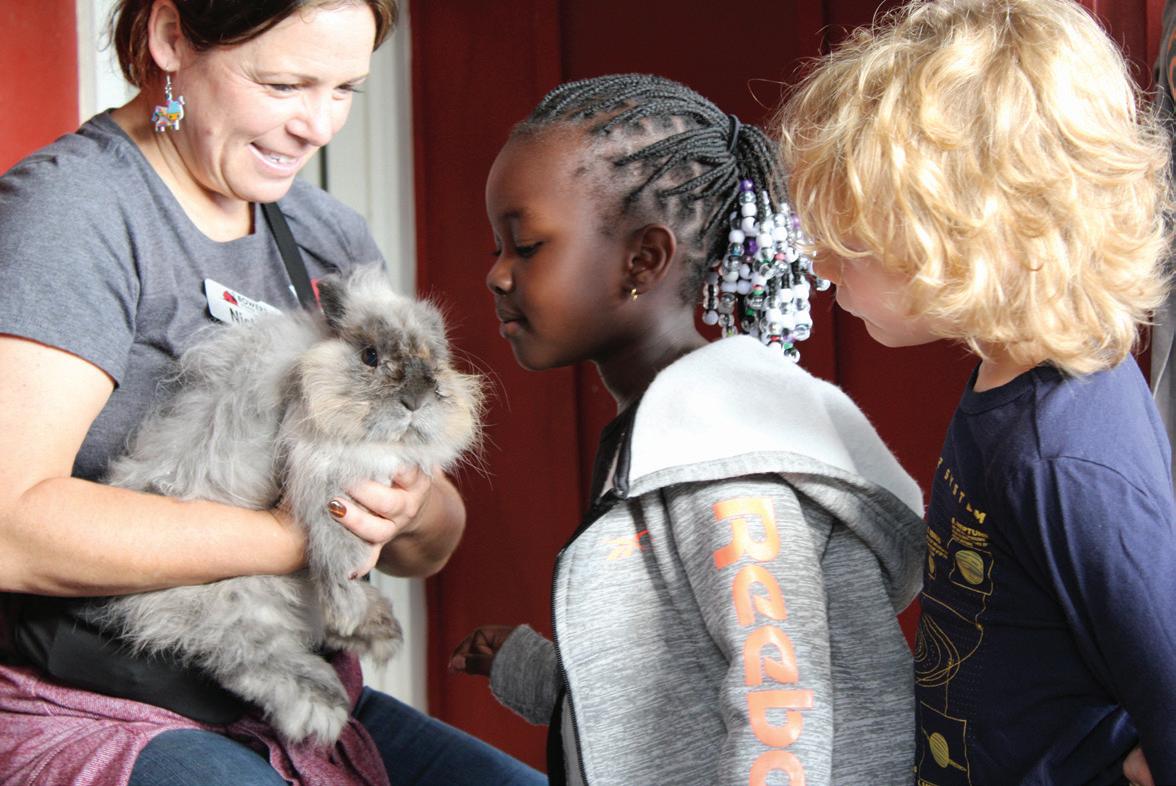
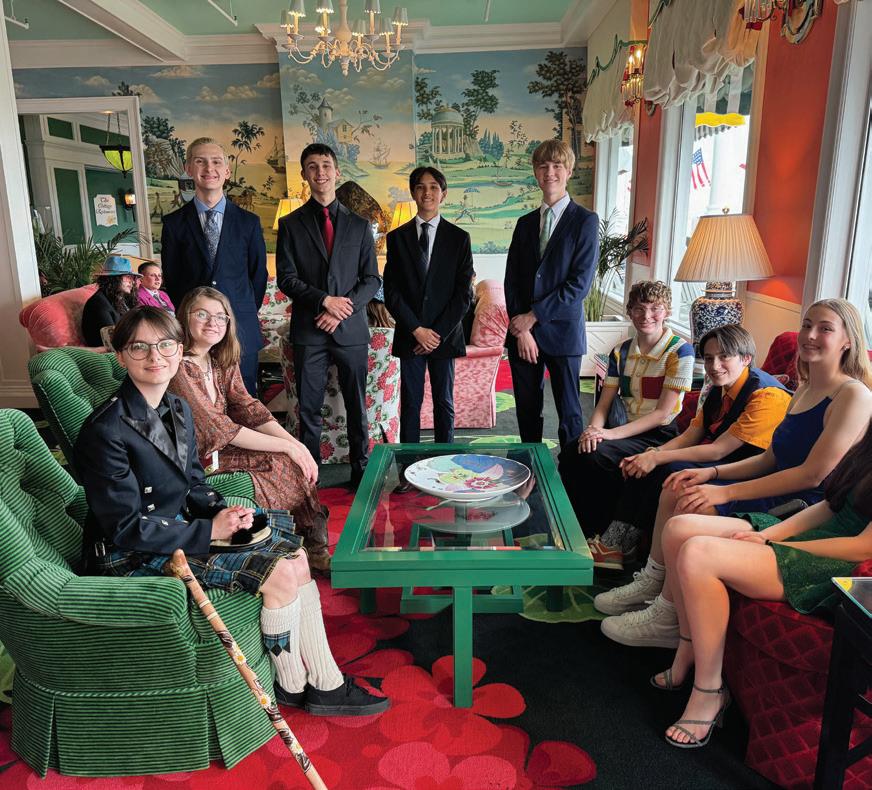

DIRECTOR OF MARKETING & COMMUNICATIONS

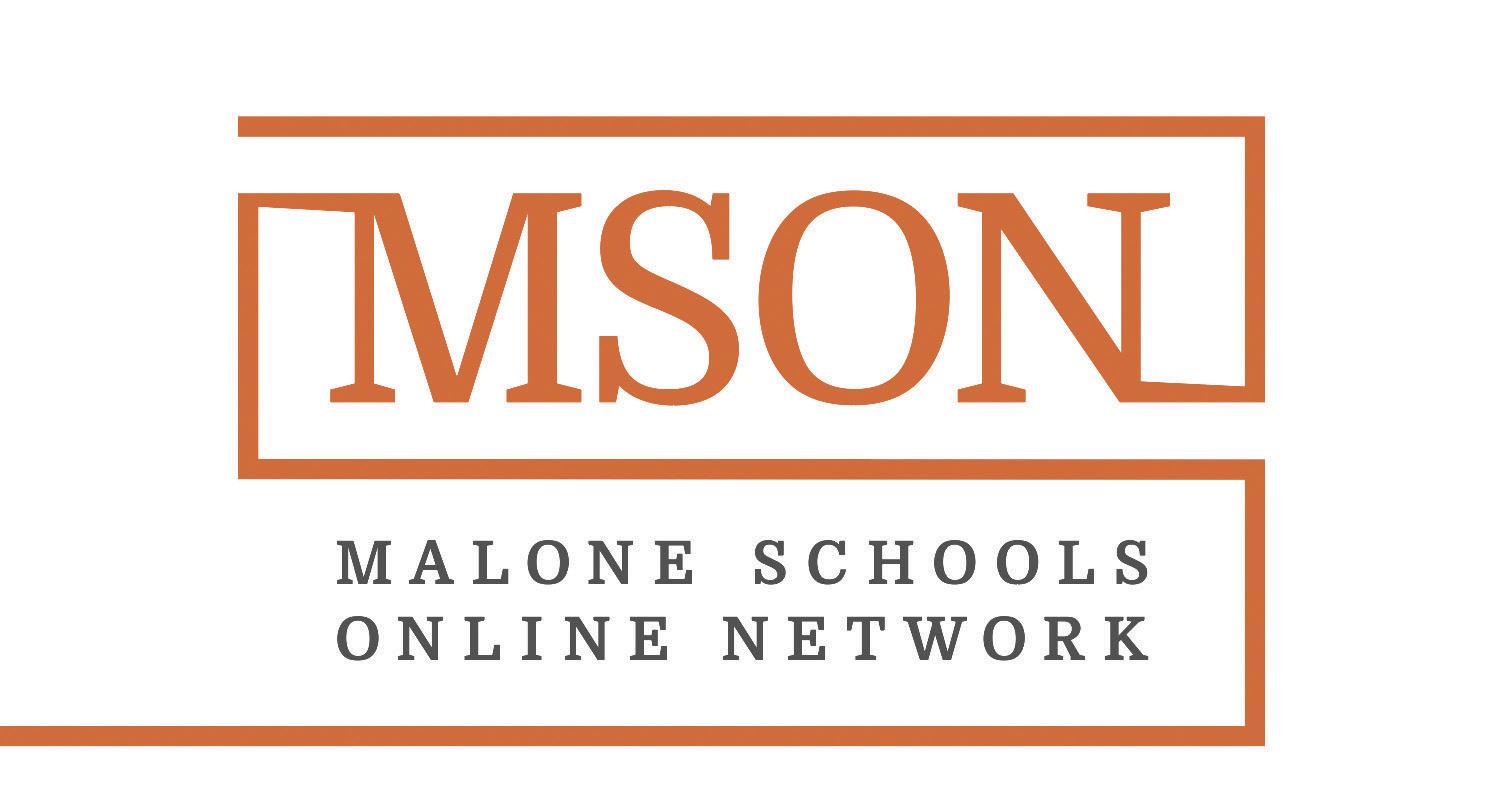
In a quiet room in the Naas Commons, a student logs into class, joining a seminar that spans time zones and perspectives. Through the Malone Schools Online Network (MSON), Roeper students connect in real time with peers from twenty-one other independent schools, exploring subjects that extend beyond a single campus. As Michigan’s only MSON member, Roeper offers Upper School students a unique bridge to a national community of thinkers.
Founded by a group of Malone Foundation schools, MSON grew out of a shared commitment to extend the opportunities made possible by the

Explore the program and hear from Dan Jacobs about his MSON course.

Foundation’s support for gifted education. The network brings together independent schools nationwide that have each received a Malone Family Foundation endowment, collaborating to offer advanced, discussion-driven online courses.
MSON gives interested students access to specialized courses not offered at their home school, such as Arabic, Multivariable Calculus, Environmental Bioethics, and Positive Psychology, that fuel curiosity and challenge even the most advanced learners. Each seminar is led by an experienced educator committed to meaningful, discussion-based learning.
Students nationwide also learn from Roeper teachers who lead MSON courses. Andrew Blechman has taught physics, and Dan Jacobs teaches Think Global, Debate Local.
MSON reflects Roeper’s belief that education should reach outward, connect individuals, and cultivate wisdom. For students, it’s not just an online course—it’s a way to live the Roeper ideal of learning without limits.
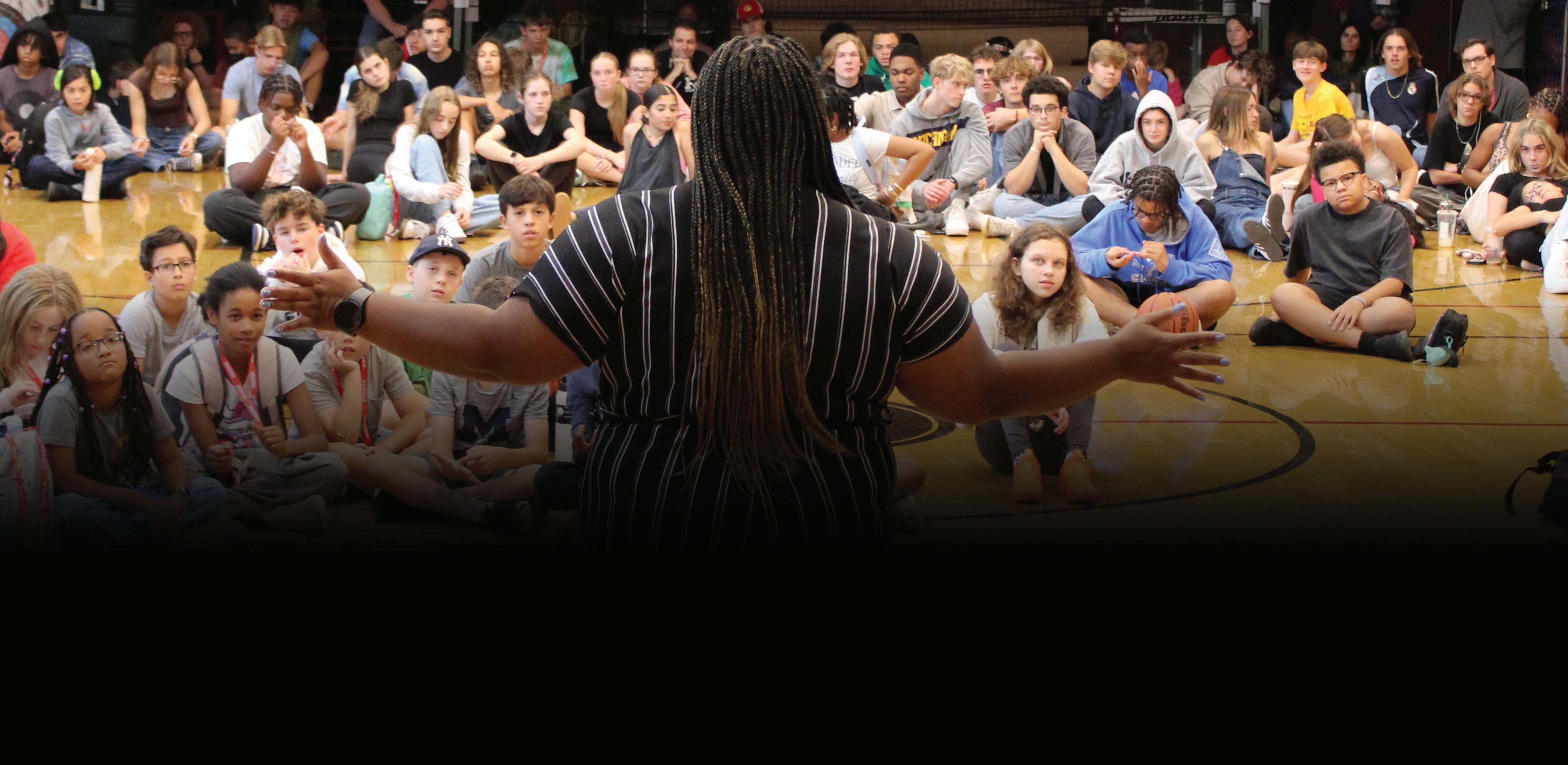

LEE MUST ’21
delivered the keynote address at the 2025 Lavender Ceremony honoring LGBTQ+ graduates at Oberlin College. Lee spoke with thoughtfulness, empathy, and conviction—qualities that embody the very best of Roeper. Their reflections offered inspiration and courage to young people who may feel vulnerable, demonstrating the impact our alumni continue to have in their communities.
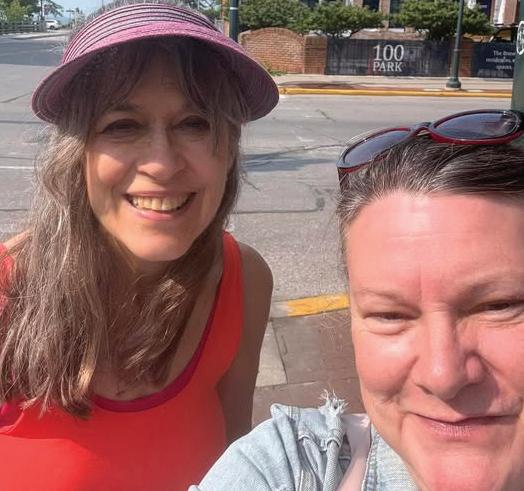
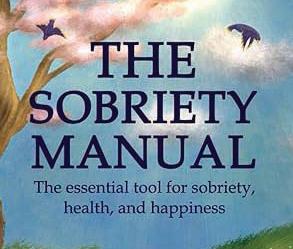
ALIYA PASIK ’93
recently published a powerful new book, The Sobriety Manual: The essential tool for sobriety, health, and happiness As Director of the Addiction Medicine Program and an Addiction Specialist Physician Assistant at RCBM, Aliya channels her devotion, experience, and compassion into helping others combat addiction and mental illness.
CARYN MARTINEZ ’81
Over the summer, Tyne Turner ’80 and Caryn Martinez ’81 had a wonderful chance to connect in Traverse City. The two reminisced about their Roeper days, shared updates on their lives, and celebrated the enduring bonds of friendship that began at school.
visited the Birmingham campus on First Friday. Vicky, a Program Manager at Consumers Energy, spoke with students about the importance of resilience, sharing candidly that her own journey has not always been easy. Through determination, perseverance, and the support of the Roeper community, she was equipped with the tools and resources to grow and thrive. Her visit was a powerful reminder of the strength and possibility that comes from leaning into challenges and believing in yourself.
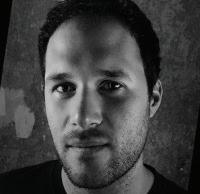
SAM WOLSON ’07
recently created the text and visuals for The New Yorker’s powerful feature, “As Told To: A Mother and Her Trans Teen Decide to Leave the U.S.” He brings to life the voices and experiences of a family navigating deeply personal and timely challenges. Sam’s work continues to reflect Roeper’s values of empathy, storytelling, and social awareness.
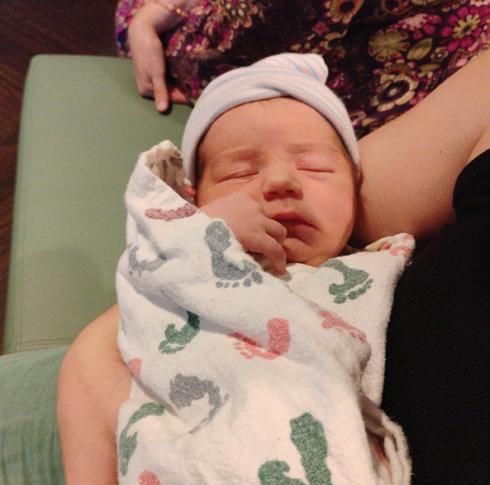
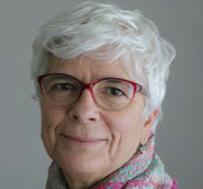
has authored a new poetry book, Sheboygan Occasions, capturing reflections from her time as Sheboygan’s Poet Laureate. The book celebrates both the city of Sheboygan and the beauty of life itself, offering readers a heartfelt and thoughtful glimpse into her experiences and creative vision.
Ozzy Fallert made his grand debut on September 1 at 12:01 am. Congratulations to proud parents Ben Fallert ’09 and Celia Kaechele, Roeper social studies teacher. Welcome to the Roeper family, Ozzy!

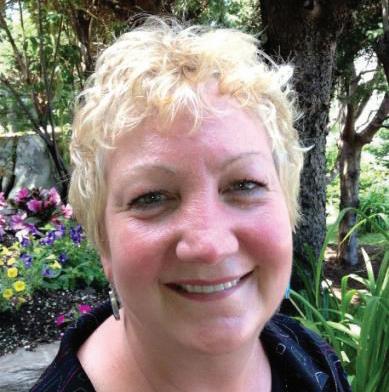
SUSAN SZABO MATTANO
We share the sad news of the passing of Susan (Sue) Szabo Mattano, a cherished alum of the Class of 1977, who died on September 5, 2025, after a courageous battle with cancer. Sue embodied Roeper’s ideals of curiosity, dedication, and service throughout her life. After graduating from Roeper, she attended Kalamazoo College, then earned her PhD in pharmacology from the University of Michigan. Her distinguished 34-year career in the pharmaceutical industry, first at The Upjohn Company and later at Pfizer, was marked by her expertise in nonclinical regulatory strategy and compliance, contributing to the approval and registration of many important medicines worldwide. Beyond her professional achievements, Sue was deeply grounded in faith and community, serving in worship commissions and embodying compassion and kindness in all her relationships. She was a devoted wife, mother, mother-in-law, friend, and mentor. We honor Sue’s legacy at Roeper: her life’s work reminds us what it means to turn knowledge into action, to serve others with excellence, and to live with grace.
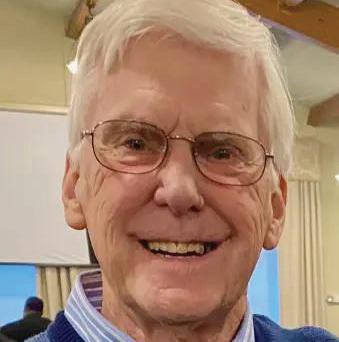
It is with deep sadness that we share the passing of John L. McConnell, who passed away peacefully on October 2, 2025, at the age of 88. John served for many years as a beloved mathematics teacher at Roeper, touching the lives of countless students with his wisdom, warmth, and passion for learning. Our thoughts are with his wife Carole Ann, his children Nicole and Kevin, and his grandchildren.
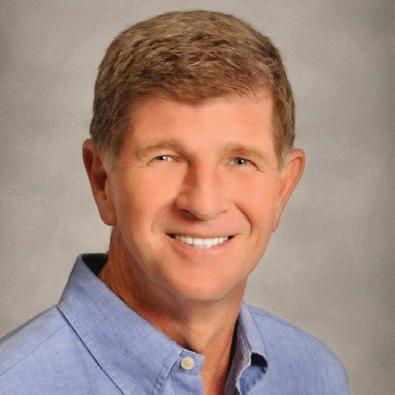
We remember educator James (Jim) DeLisle who passed away on October 16, 2025. Jim was a staunch advocate for gifted education, author of Dumbing Down America: The War on Our Nation’s Brightest Young Minds and The Gifted Kids’ Survival Guide: A Teen Handbook, former Roeper Board member, and cherished friend. He was also a contributor to the Roeper Review. His insight, compassion, and advocacy for gifted learners profoundly shaped our community. His legacy of empathy and understanding continues to guide and inspire us.
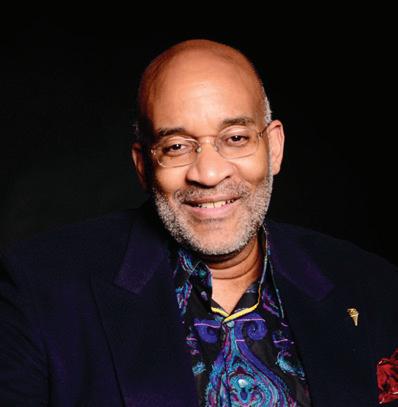
It is with profound sorrow that we honor the passing of Michael Dinwiddie ’73* on July 4, 2025. Michael remained closely connected to Roeper’s values throughout his life and went on to build an extraordinary career as Associate Professor of Playwriting and Theater at New York University. His work encompassed cultural studies, African American theater history, dramatic writing, filmmaking, and ragtime music. A dedicated leader in the arts community, Michael served as Board President of the August Wilson Society, contributed significantly to preserving and promoting African American theater, and was a staff writer for ABC-TV’s Hangin’ with Mr. Cooper Among his many accolades, he received NYU’s Distinguished Teaching Award in 2005, honoring his profound impact in and beyond the classroom. Michael’s creativity, leadership, and dedication to the arts leave an enduring legacy. *Attended but did not graduate from Roeper.

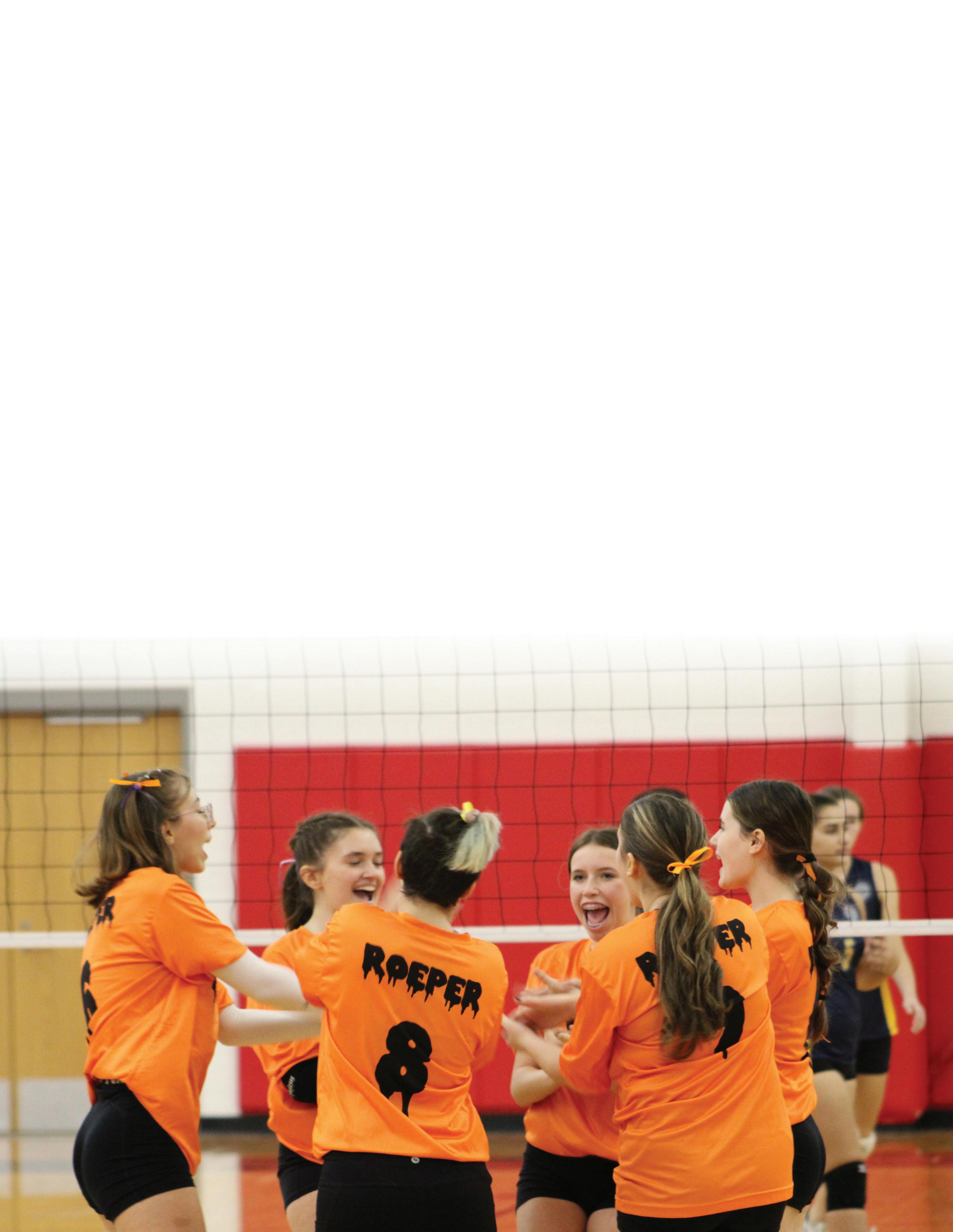
41190 WOODWARD AVE
BLOOMFIELD HILLS MI 48304-5020
ELECTRONIC SERVICE REQUESTED